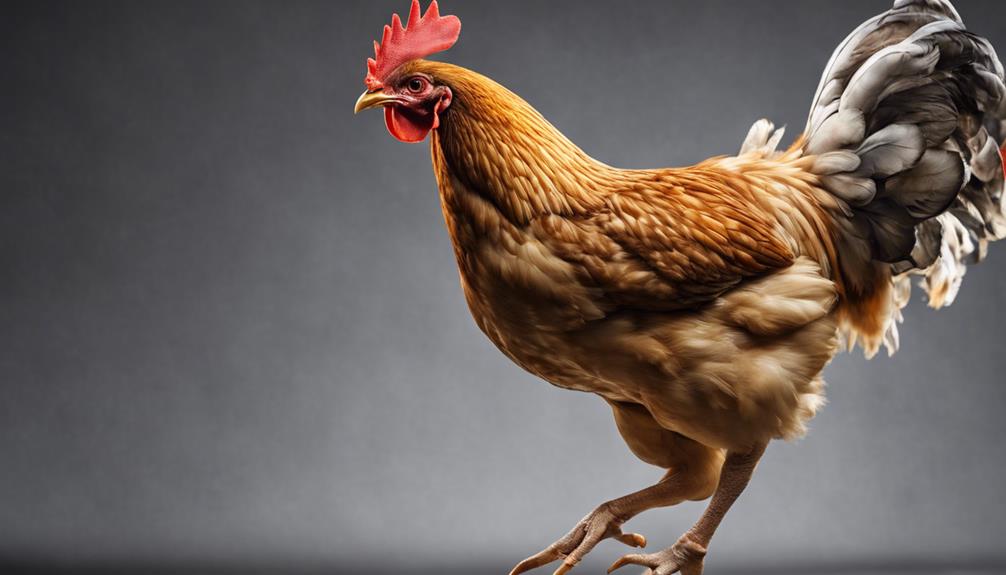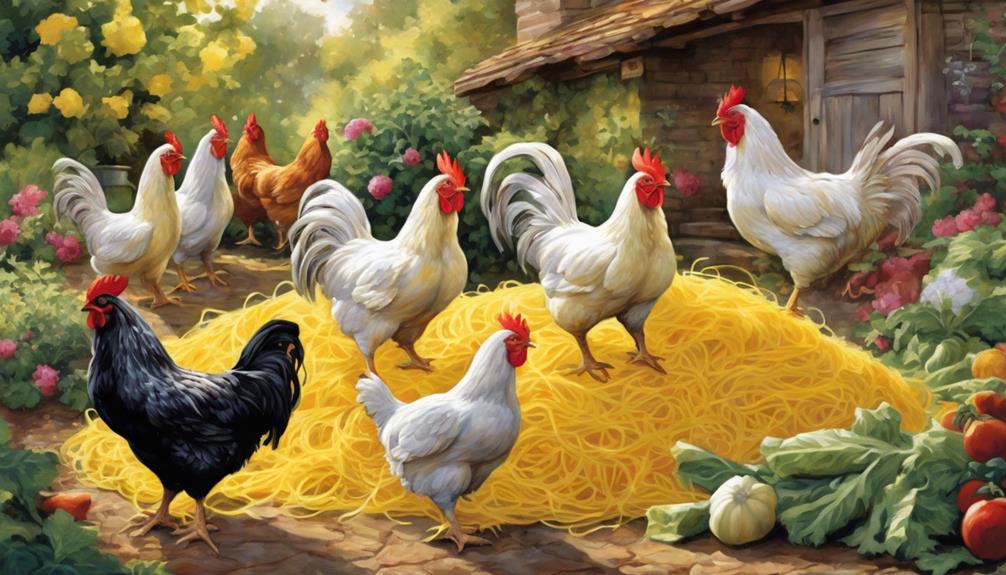When it comes to feeding chickens, red cabbage is an excellent option. It is rich in vitamins, minerals, and antioxidants that are essential for their overall health and egg production. Additionally, red cabbage is a good source of fiber which helps with digestion and promotes a healthy gut. It is important to rinse and chop the cabbage before giving it to your feathered companions, and remember to offer it in moderation to avoid any potential imbalances.
If you're curious about more vegetable options for your chickens, there's a whole list of nutritious treats waiting to be discovered!
Key Takeaways
- Offer red cabbage in moderation to maintain a balanced diet.
- Chop or shred red cabbage for easy consumption and digestion.
- Inspect red cabbage for quality and rinse to remove pesticides.
- Feed red cabbage once or twice a week as a healthy treat.
- Monitor chicken health and droppings when introducing red cabbage.
Benefits of Red Cabbage for Chickens
Red cabbage stands out as a nutritious addition to a chicken's diet due to its rich content of vitamins, minerals, and antioxidants essential for promoting optimal health and egg production. This vegetable is a powerhouse of vitamins A, C, and K, crucial for overall well-being and enhanced egg production in chickens. The presence of minerals such as calcium, iron, and potassium in red cabbage supports bone strength and metabolic functions, contributing to the chickens' vitality. Additionally, red cabbage provides antioxidants like anthocyanins, which play a vital role in boosting immune health and reducing inflammation in these birds.
Moreover, the high fiber content in red cabbage aids digestion and helps maintain a healthy gut environment in chickens. By incorporating red cabbage into their diet, chickens can experience enhanced nutritional diversity, leading to improved overall well-being and egg quality. This nutritional boost from red cabbage can significantly contribute to the vitality and productivity of your flock.
Safe Feeding Practices for Chickens
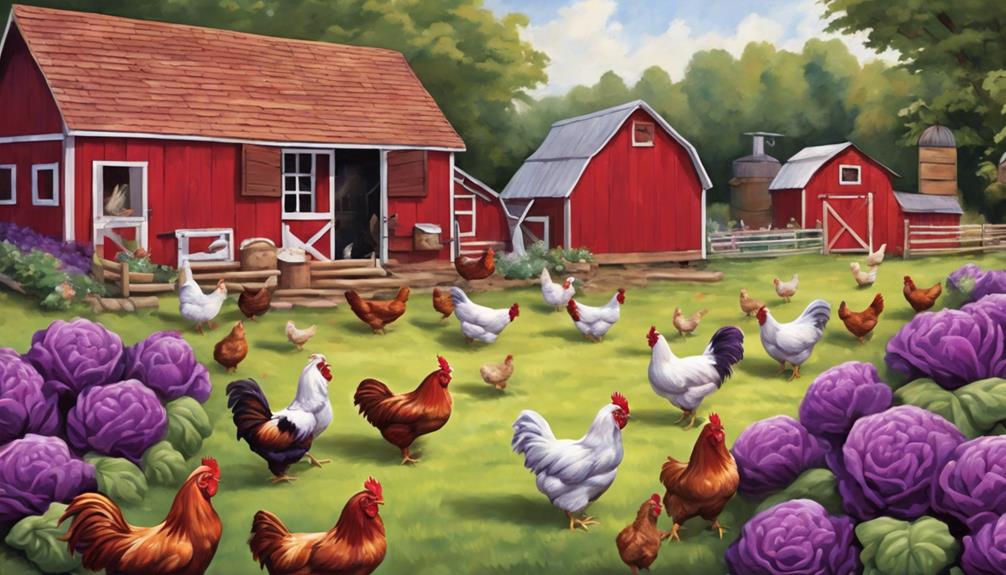
When feeding chickens cabbage, it's crucial to follow safe practices to ensure their well-being and digestive health. Start by rinsing and inspecting fresh cabbage to guarantee its quality and safety. Remove any moldy or rotten spots before offering it to the chickens to prevent potential health issues. Consider chopping the cabbage into small, manageable pieces to facilitate consumption and aid in digestion.
If you choose to feed cooked cabbage, you can provide it in larger pieces since the cooking process softens it, making it easier for the chickens to eat. It's important to remember to offer grit along with cabbage to the chickens. Grit helps in the digestion of fibrous foods like cabbage and prevents blockages in their digestive system.
Introducing Red Cabbage to Chickens
Inspecting red cabbage thoroughly before introducing it to chickens ensures their safety and well-being while providing a nutritious addition to their diet. Here are some key points to consider when introducing red cabbage to chickens:
- Nutrient-Rich: Red cabbage contains essential nutrients like vitamin A, which is crucial for chicken health.
- All Parts Consumable: Chickens can consume all parts of the red cabbage plant, including the roots, stalks, core, and leaves.
- Thorough Washing: It's important to wash red cabbage thoroughly to eliminate any pesticides present on the surface.
- Moderation is Key: Feed red cabbage to chickens in moderation to prevent nutritional imbalances and potential health issues.
Quantity and Frequency of Red Cabbage Feeding
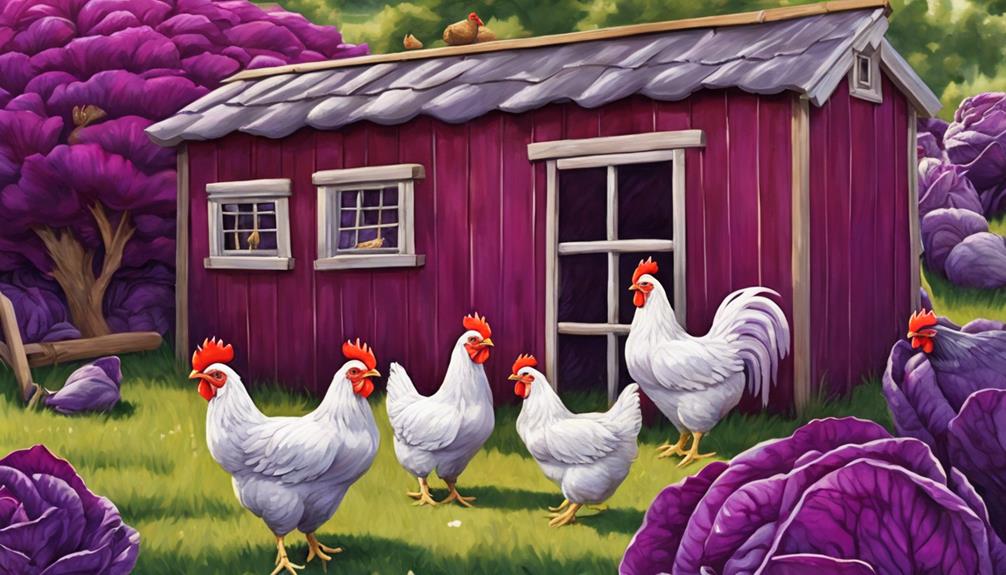
To ensure optimal health and nutrition for chickens, carefully regulate the amount and frequency of red cabbage provided in their diet. Red cabbage should be fed to chickens in moderation, constituting no more than 10% of their overall diet to prevent any nutritional imbalances. This nutritious vegetable can be offered to chickens once or twice a week as a healthy treat, complementing their regular feed. It's essential to maintain a balanced diet for chickens, with 90% of their intake coming from their regular feed and the remaining 10% from treats like red cabbage to promote overall well-being.
When feeding red cabbage to chickens, ensure it's prepared in a way that facilitates easy consumption and digestion. Providing the cabbage shredded or chopped finely will make it easier for chickens to eat and digest. Monitoring the chickens' droppings and overall health upon introducing red cabbage to their diet is crucial to promptly identify any adverse reactions and adjust their consumption accordingly. By following these guidelines on quantity and frequency, chickens can enjoy the benefits of this nutritious vegetable as part of a balanced diet.
Other Recommended Vegetables for Chickens
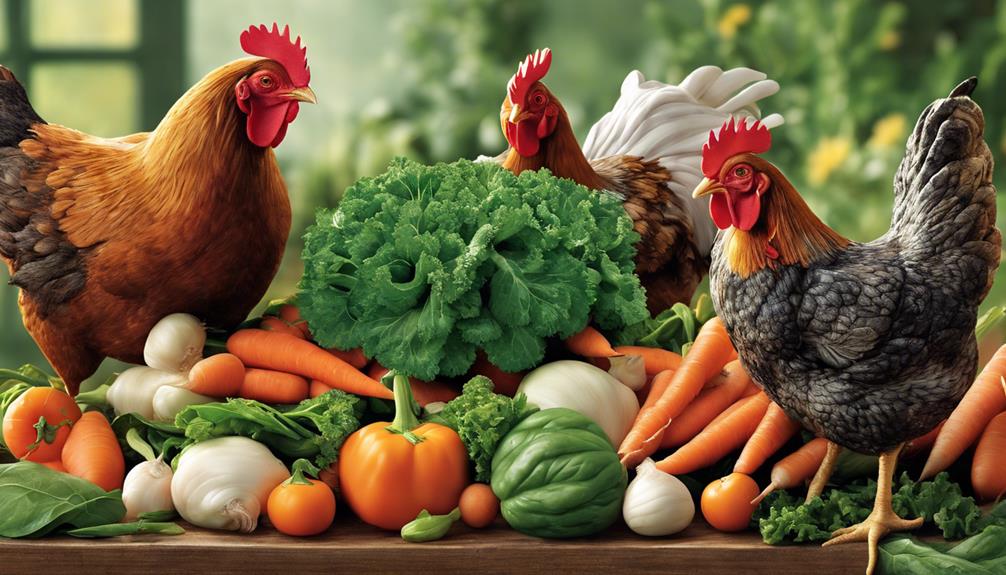
Regulating the variety and quantity of vegetables in a chicken's diet is key to ensuring a balanced nutritional intake. When considering other recommended vegetables for chickens, one should focus on nutrient-rich options to promote optimal health. Here are four vegetables that can benefit chickens:
- Spinach: This leafy green is a powerhouse of nutrients, containing iron, vitamin A, vitamin K, and folate. These components support overall health and vitality in chickens.
- Radishes: Rich in vitamin C, potassium, and fiber, radishes offer a diverse array of essential nutrients for chickens, contributing to a well-rounded diet.
- Lettuce: With its high water content, fiber, and vitamins A and K, lettuce serves as a refreshing and hydrating snack for chickens, aiding in digestion and providing essential nutrients.
- Spaghetti Squash: Low in calories yet high in fiber and vitamin C, spaghetti squash is an excellent option for chickens seeking a nutritious treat that supports digestive health and immune function.
Incorporating these vegetables into a chicken's diet can enhance their overall well-being by providing essential vitamins, minerals, and fiber.
Frequently Asked Questions
What Is a Superfood for Chickens?
Red cabbage stands out as a superfood for chickens due to its exceptional nutrient profile. Packed with essential vitamins like A, C, and K, along with minerals such as calcium, iron, and potassium, it supports overall health and egg production.
The high fiber content aids digestion and promotes gut health. Including red cabbage in their diet enhances a chicken's nutrition plan, contributing to their well-being and vitality.
What Vegetables Cannot Be Fed to Chickens?
Vegetables that can't be fed to chickens include raw beans, processed foods like chips and candies, coffee and coffee grounds, avocado with its skin and pit, as well as onions and garlic. These items can be harmful to chickens due to toxins present in them.
It's crucial to avoid feeding these vegetables to ensure the health and well-being of our feathered friends.
What Is the Most Nutritious Food for Chickens?
When it comes to the most nutritious food for chickens, a balanced diet is key. Incorporating a variety of nutrient-rich foods like grains, seeds, fruits, and vegetables ensures they receive essential vitamins, minerals, and proteins.
Additionally, high-quality commercial feeds formulated specifically for chickens can provide a well-rounded nutritional profile. It's important to consult with a poultry nutritionist to tailor a diet that meets the specific needs of your flock for optimal health and productivity.
Is Lettuce and Cabbage Good for Chickens?
Yes, lettuce and cabbage are beneficial for chickens. They provide vital nutrients like vitamins, minerals, and fiber. The inclusion of these vegetables in their diet aids in digestion, hydration, and overall well-being.
Both raw and cooked forms can be fed to chickens for dietary variety and enrichment. Additionally, incorporating lettuce and cabbage supports egg production, feather health, and vitality within the flock when given in moderation.
Can Chickens Eat a Variety of Vegetables for a Balanced Diet?
Yes, feeding chickens spaghetti squash can be a great addition to their diet. Chickens can eat a variety of vegetables such as spinach, kale, carrots, and broccoli. These veggies provide essential nutrients and help create a balanced diet for your chickens.
Conclusion
In conclusion, feeding red cabbage to chickens can provide them with essential nutrients and antioxidants for overall health. Remember to gradually introduce this vegetable to their diet, monitor their intake, and balance it with other recommended vegetables.
By incorporating red cabbage into their feeding routine, you can ensure that your flock stays healthy and happy. So go ahead and let your chickens enjoy some 'hip' red cabbage to boost their well-being!

